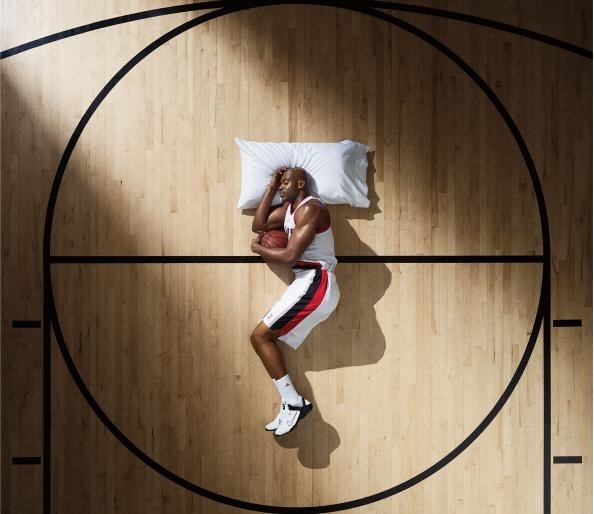
Photo Credit: Men's Health
One of the most important keys to athletic performance and endurance is often overlooked—sleep! If you are feeling tired, unmotivated, or weak during your workout, lack of quality sleep could be to blame. Lack of quality sleep leads to low energy, increased risk of injury, and reduces your ability to perform at a high level the next day. Adequate quality sleep recharges the Central Nervous System which not only triggers muscle contractions but also increases reaction times and sensitivity to pain receptors. It also "recharges" energy levels elevating mood and ability to perform during a workout. Finally, quality sleep results in optimal endocrine function which results in muscle growth from the production of nitric oxide, secretion of growth hormone and testosterone and depression in cortisol, the “stress” hormone levels.
Stages of Sleep and Athletic Benefit
Sleep has four stages, but contrary to popular belief, they are not continuous. Sleepers cycle through the stages continually through the night. Those people with sleep disorders like Obstructive Sleep Apnea (OSA) experience fragmented sleep which results in impaired ability to replenish the immune system, support metabolic function, and production of growth hormone. They do not spend adequate periods of time in each sleep stage to reap all the health benefits of quality rest. Each stage of sleep is essential to overall health and athletic performance.
Stage One
Stage One happens in one-to-seven-minute bursts and occurs when the brain is still active but is slowly drifting into sleep. As the brain is still active, the body records movements it makes during the day. This is often referred to as muscle memory and is crucial to enhanced athletic performance in future workouts. The body is at this stage for only five percent of the night.
Stage Two
Stage Two is the onset of sleep where the body temperature drops, but the heart rate is still normal. Major athletic benefits occur during this period such as the production of human growth hormone (HGH) and muscle tissue, as well as the regulation of the metabolism and hormones. This stage happens in 10-25 minute bursts and comprises about 45% of the total night’s sleep.
Stage Three
In Stage Three, sleepers are harder to wake, and this is often referred to as “deep sleep.” Blood supply and HGH to muscles increases, energy is restored, and prolactin is released to assist in muscle recovery. This stage happens in 20-40-minute bursts and is about 25% of total sleep.
Stage Four
Rapid Eye Movement (REM) happens in Stage Four as the body becomes immobile and dreams occur. This stage supports the next day’s athletic performance. This stage lasts between 20-40 minutes and is responsible for the remaining 25% of the night’s sleep.
Photo credit: The Centers for Sound Sleep
Strategies to Improve Sleep Quality
To keep your daily gains from becoming nightly losses, here are a few guidelines for getting the high-quality sleep needed every night to support athletic performance and muscle health.
Sleep Environment
An optimal sleep environment begins with a good mattress, sheets, and pillows. The room should be no warmer than 69 degrees Fahrenheit and should be devoid of light. The dip in temperature slows the heart rate and encourages the body to fall asleep faster. Lack of light tells the body to produce melatonin which tells the body it is time to rest.
Nutrition
It is best not to eat a minimum of two hours before sleep and to avoid spicy, fatty, or heavily processed foods as your body will be digesting all evening instead of focusing solely on repair and rejuvenation. A natural sleep remedy like turmeric milk is an age-old Ayurvedic practice to not only prepare the body for sleep but also fight inflammation. Melatonin (in pill form) and tart cherry juice can also aid in preparing the body for rest.
Sleep Rituals
In this technological age, some of the best advice one could follow is to turn off all electronic devices a minimum of one hour before turning in. The blue light that emits from these devices can confuse the brain into believing it is still daytime and not yet time for sleep. Once the devices are turned off and stowed, quiet the mind and body with meditation, positive self-talk, or a good book. These activities lower heart rate and make it easier for the body to fall and stay asleep.
Remember, it is not enough to get eight hours of sleep. Quality of sleep is far superior to quantity of sleep. In some cases, it is better to get six hours of quality sleep rather than right hours of sub-par sleep. Follow the tips above to improve your performance in the gym and the sheets.